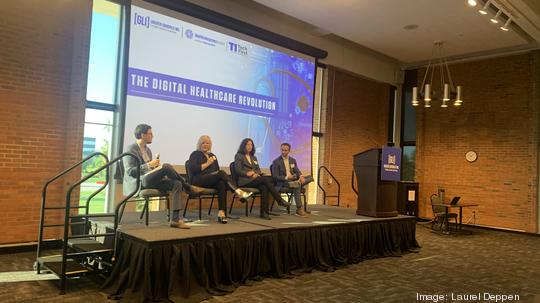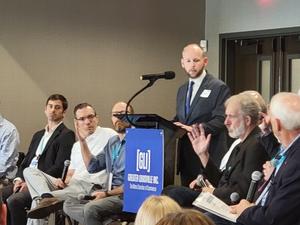
As the health care scene rapidly changes with evolving technology, Louisville may be able to lead the charge, according to local health tech leaders.
The Health Enterprises Network, the health care arm of Greater Louisville Inc., Louisville’s chamber of commerce, hosted a forum discussing the health care technology ecosystem Wednesday morning.
Panelists included Tammy York Day, president and CEO of CEOc, previously known as the Louisville Healthcare CEO Council; Grace Simrall, chief of civic innovation and technology for Louisville Metro Government; and Rob Cohen, CEO of Bamboo Health.
The panel, hosted by Logan Gatti, executive director of HEN, discussed the issues of workforce and utilizing health data to improve health outcomes and the industry as a whole.
Can digital health care impact patient outcomes?
Cohen said since the Affordable Care Act, many conversations have focused on turning health care from a reactive system to a proactive system. As opposed to treating patients only when they’re sick, a new model would work on sustaining health.
“Digital health is really about allowing that to happen, as I said, by creating those efficiencies, by extending that capacity,” Cohen said. “It's about how to surround the riskiest people on down to, quite frankly, the healthiest people with the right amount of resources to care to make sure they're staying ahead of their health and to make sure that they are remaining healthy.”
York Day added that part of the outcome conversation has to include equity.
“When we look at digital health as the tool, the way that that we really can drive those health outcomes and health equity by applying it appropriately and effectively, we're at that time that leveraging it the right way is how we live because we can't have better health outcomes as a society without addressing health equity,” York Day said.
How will digitalized health care impact the work force?
York Day said one of the key issues impacting health care CEOs is workforce challenges. She said in the future, 28% of jobs were at risk of being lost due to automation. Similarly, there will soon be more people over the age of 65 than under the age of 18.
York Day said this can be combatted by the health care ecosystem identifying what skills or certifications are needed for staff as soon as they enter, so training resources can be made available.
“We want the technology to be able to ease the burden on workforce, and we have a real opportunity,” she said.
The health care workforce needs to grow its skillset in order to adapt to new technologies, Simrall said.
“Those individuals need digital skills, but they will need to have a new skills that might not even exist yet,” Simrall said. “So how do we together, have an industry work with training providers and education providers to figure out how to nimbly adjust and provide those skills to this expanding workforce?”
From the health tech hiring side, Cohen said there is a war on talent. He said salaries have skyrocketed for people with particular skills, such as engineering and web developing. Cohen said the ability to attract and retain this talent is difficult when competing with remote-flexible jobs.
He said Louisville would benefit from developing from within — meaning the area’s schools and companies can work on growing the right talent.
What can Louisville do to make itself a leader in digital health care?
Cohen said a way to kickstart a startup community in a city is to have large, established company already in the city. He credited Seattle's startup boom to the presence of Microsoft, which led its employees to spin off new companies in the city. He said Louisville has an advantage by having Humana Inc. (NYSE: HUM).
Cohen said Louisville will also have to attract other companies to the city to spur more innovation, from “tax incentives to highlighting the talent that's already here that they can take advantage of [and] highlighting what a great place to live it is, to get companies to relocate.”
But Simrall was quick to differentiate Louisville from a startup hub like Silicon Valley, because it contains domain experts who understand health care from all angles. She said Louisville can similarly position itself for innovation by working with universities to create an entrepreneurial system.
“Instead of waiting for our big unicorn, let's create our future,” Simrall said. “We don't have to wait for anyone to do that. So I think that's why the forming of the coalition is such an important step in realizing that model of innovation for our city.”











